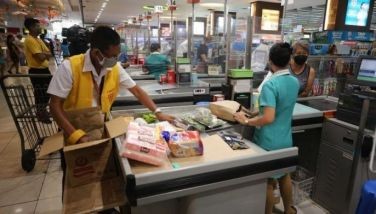Phl to remain as fastest-growing economy in Southeast Asia
MANILA, Philippines - The Philippines is expected to remain as one of the fastest-growing economies of the East Asia and Pacific as the region grows by 7.1 percent this year, the World Bank announced on Monday in its latest update for the region.
After posting a 7.2-percent growth in 2013, the World Bank said that it expects the Philippine economic growth to slow down to 6.6 percent this year before rising to 6.9 percent in 2015. For 2016, the bank sees a gross domestic product growth rate of 6.5 percent.
The East Asia and Pacific region's growth rate is expected to slow down from an average of 8 percent from 2009 to 2013. In China, growth will slightly dip to 7.6 percent this year from last year's 7.7 percent. Excluding China, the developing economies in the region are expected to grow by 5 percent, down from 5.2 percent in 2013, the bank said. Despite easing growth, however, Regional Vice President Axel von Trotsenburg said the East Asia and Pacific will benefit from strong global growth, allowing the region to expand at a relatively steady pace while adjusting to tighter global financial conditions.
In the Philippines, the bank said reconstruction spending would offset the drag on consumption from the effects of natural disasters that hit the country last year.
The report said the country can benefit from structural reforms, such as facilitating trade and promoting foreign direct investment, especially in the services sector. It added that the establishment of the ASEAN Economic Community next year would boost inta-regional investment and exports and provide an important source of growth.
"Reforms for attracting more foreign investments will work best for the country if done as part of broader changes. These reforms could be complemented by measures to improve logistics and trade facilitation as well as the cost of doing business to encourage more investments from both local and foreign firms, big and small," World Bank Country Director Motoo Konishi said.
World Bank Lead Economist Rogier van den Brink said job creation by firms of all sizes in agriculture and manufacturing is necessary to make growth in the Philippines inclusive.
"Reforms to secure property rights, enhance competition, simplify regulations and increase investments in health, education and infrastructure can make this happen," Van den Brink added.
Bert Hofman, the region's chief economist, said the country also needs to push the rationalization of fiscal incentives, improve tax administration and implement reforms in customs. He said there is no need for new taxes in the Philippines, but revenues have to be raised to address the inadequacy in infrastructure.
Senior country economist for the Philippines Karl Kendrick Chua said in order to the Philippines to post growth beyond 7 percent, it has to attract investments by spending on infrastructure to address problems in airport congestion, traffic, ports and shipping.
In terms of regional risks, Hofman said a slower-than-expected recovery in advanced economies, a rise in global interest rates and increased volatility in commodity prices due to geopolitical tensions in Eastern Europe pose a threat to the region's growth. On the flipside, he said flexible currencies will help East Asia deal with external shocks, including potential capital-flow reversals. Hofman added that most countries have adequate reserves to cover temporary trade and external shocks.
- Latest
- Trending































